Apply now to join our next cohort of Community Science Fellows and Community Leads!
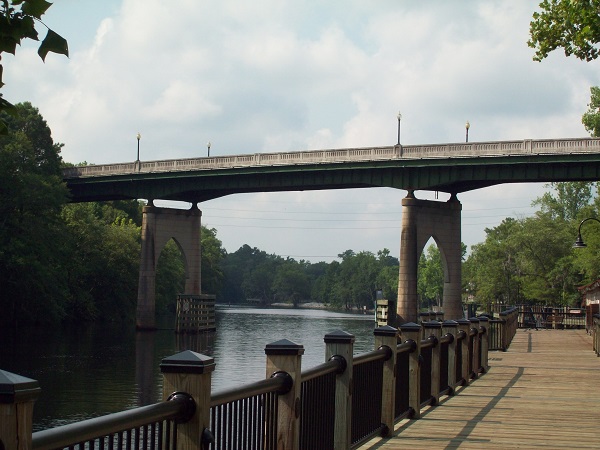
Waccamaw River Memorial Bridge in Horry County, SC (Courtesy of Wikimedia Commons)
Staff note: This project builds on initial results of a previous project in this community.
Horry County is a coastal community in the northeastern coastal plain of South Carolina. Located along the Atlantic Ocean, with three major rivers (Waccamaw, Little Pee Dee, and Lumber Rivers), more than 50% of the incorporated county includes wetlands, marshes, and other water features. Well known for its beaches, including the popular tourist destination, Myrtle Beach, Horry County is also home to the City of Conway, a historic river town established in 1732 along the Waccamaw River, as well as numerous wetlands, forests, and farmlands.
Horry County is also the largest county in South Carolina and the second fastest growing municipality in the nation. More than 35,000 people have moved to the county over the past two years and conservative estimates of population growth predict 275,000 new residents by 2040. The growing population of Horry County has led to an increase in development and urbanization. However, the current county codes, ordinances, and infrastructure were not designed to accommodate the current pace of population growth and development. Since 1996 the county has seen a 22% increase in impervious cover, and loss of forested and wetland area. With about 24% of the county located within the 100-year floodplain, continued development and urbanization have contributed to an increase in flooding.
Over the past four years, Horry County has experienced 3 catastrophic flooding events as a result of Tropical Storm Joaquin, Hurricane Matthew and Hurricane Florence. Residents of Horry County are vulnerable to storm surge, riverine and flash flooding. Community members have taken steps to improve flood resilience, including through the establishment of Horry County Rising: a grassroots movement by the people of Horry County to help affected families mitigate their flood risk and vulnerability through education, empowerment, and engagement. However, given the limitations of existing zoning ordinances and codes, challenges still remain in managing development to improve flood resilience.
Horry County Rising is seeking expertise to conduct a cost-benefit analysis (or similar economic evaluation) of various flood mitigation policies and zoning ordinances applicable to the county. The project will build on recent work conducting a literature review of existing approaches from other US localities. As a result of this collaboration, Horry County Rising will gain a better understanding of the economic implications of policy options available to mitigate riverine flooding risk in their community. This information will help the community better target future efforts, and provide critical data (e.g., associated costs and benefits) needed to advocate for flood resilience planning and policy at the county scale.
Project Outputs may include:
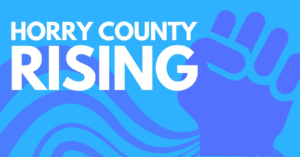
Horry County Rising is a grassroots movement by the people of Horry County to help affected families mitigate their flood risk and vulnerability through education, empowerment, and engagement. Horry County Rising is a member of Higher Ground, an initiative of Anthropocene Alliance and the largest flood survivor network in the country. Higher ground has more than 45 chapters across 22 U.S. states, representing 35,000 flood survivors and their neighbors.
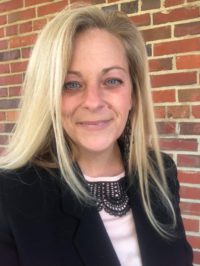
April O’Leary is a Founder and President of Horry County Rising, located in Horry County, South Carolina. April lives in the City of Conway, a beautiful historic river town. City of Conway is located along the Waccamaw River and has experienced several catastrophic flood events in recent years. After Hurricane Florence the Waccamaw River crested at 21.16 feet, 12+ feet above normal level and flooded April and her family along with 400 city residents. April works with residents across Horry County South Carolina through Horry County Rising, a 501 non profit social welfare organization serving flooded communities whose mission is to prevent property damages by focusing on flood mitigation by engaging impacted families in local and state governments. April has 25+ years working in nonprofit management assisting vulnerable populations and has a BA.

Duncan Dodson is a master’s candidate at University of North Carolina-Chapel Hill, in the City and Regional Planning Department. He is currently studying coastal and riparian hazard mitigation planning, with a focus on social vulnerability and participatory community planning strategies. He has worked on a variety of technical assistance programs at the federal and local level relating to community engagement, natural resource conservation, historic preservation, and green infrastructure. He is originally from Tulsa, Oklahoma where he grew up accustomed to flooding events and tornadoes. He is excited to support the team through research informed by his life, career, and academic experiences.
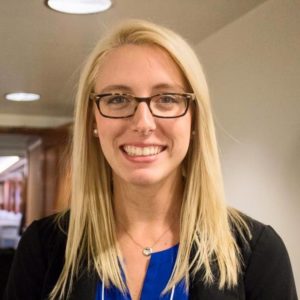
Cheyenne Maddox currently serves as the Outreach and Events Manager for the Sustainable Development Solutions Network (SDSN). She manages the planning and execution of events hosted by the SDSN and serves as the Communication Lead for the SDSN by managing the social media, newsletter, and media and stakeholder outreach. Cheyenne holds a B.A. in International Studies from the University of Kentucky. She enjoys hiking, camping, and attending concerts in her free time.
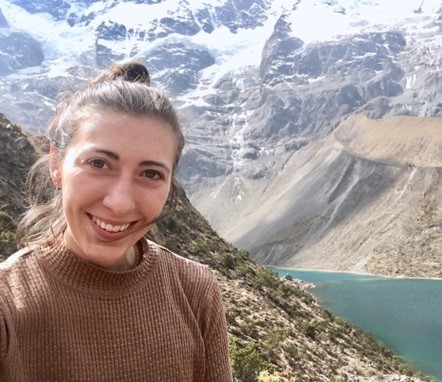
Anna LoPresti is the Sustained Assessment Specialist with the Consortium for Climate Risk in the Urban Northeast, a NOAA RISA program. She is based at Columbia University in New York, where she conducts research on local climate adaptation activities in the region as ongoing input into the National Climate Assessment. She works with stakeholders to ensure that climate information is locally relevant, accessible and successfully integrated into decision-making in the urban corridor from Philadelphia to Boston. Anna is a member of the Environmental Justice Working Group with WE ACT for Environmental Justice, a community-based organization in Northern Manhattan. She holds a Masters of Science in Environmental Change and Management from the University of Oxford and a Bachelor of Arts in Sustainable Development from Columbia University. Anna is originally from Tower Lakes, Illinois.
(c) 2025 Thriving Earth Exchange